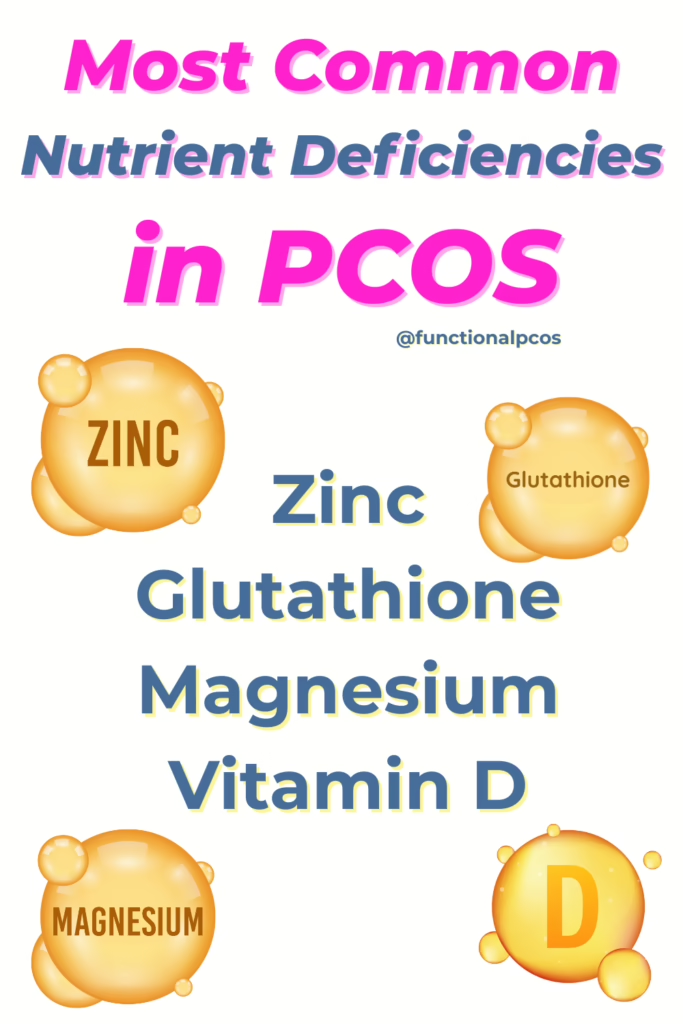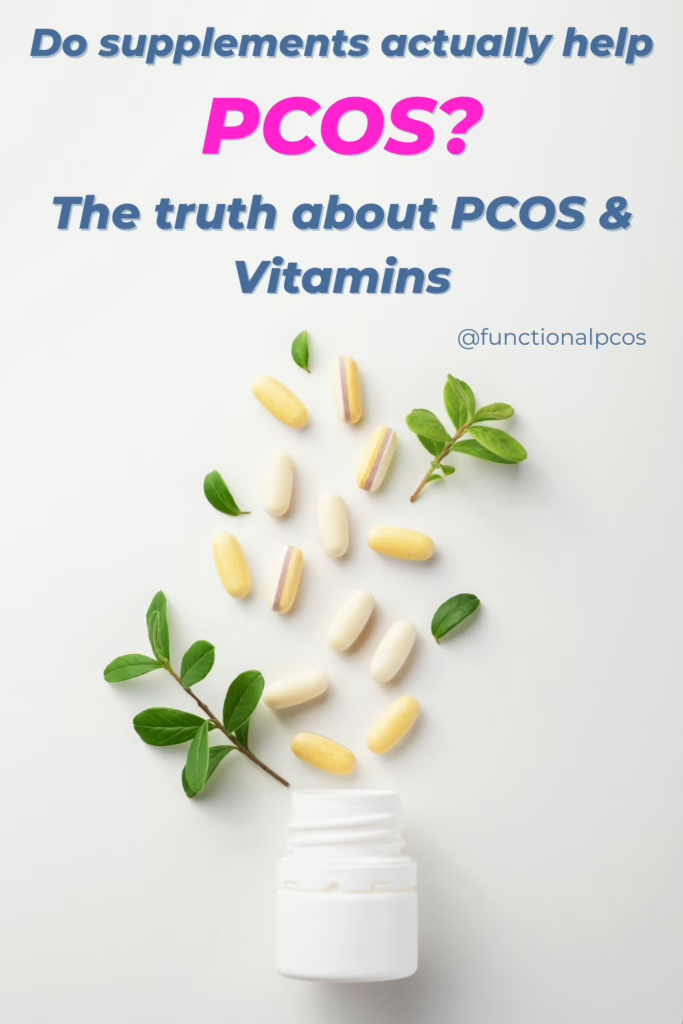- Share using Native toolsShareCopied to clipboard
- Share on Pinterest (Opens in new window)Pinterest
- Share on X (Opens in new window)X
Do Supplements Work for PCOS?
When I work with new clients, I often get sceptisicm or questions about whether supplements wor for PCOS. PCOS vitamins are a huge marketing area because women with PCOS are a large group with few working options or solutions for reducing their symptoms.
In addition, nutrition is key to the management of PCOS symptoms and nutritional supplements can often support those improvements, especially when looking at PCOS from a functional nutrition perspective.
Do PCOS Vitamins or Supplements work for PCOS- really?? The myths of a food-first approach
But frequently in my initial consults with clients, I hear the following comments:
“I’d rather not take any pills, including supplements, I want to do everything with food.”
I understand where this thought process comes from. Not only are women tired of the conventional medical treatment of a “pill for every ill”, they are also tired of the common holistic sales pitch about herbs and supplements.
Women with PCOS are especially drained from being marketed to and with good reason. It’s easy to assume these pcos vitamins are all about sales and in answer to the question do supplements work for PCOS, the response might be a resounding no!
Common mistakes of a functional nutrition approach to PCOS vitamins and supplements
In functional medicine, I find it’s especially common to see practitioners focusing first on supplements, putting clients on long lists of pills to address deeper concerns, with very little regard for modifying the diet to make up these differences. It’s frustrating and, in my opinion, not in keeping with the real principles of functional medicine which rely heavily on nutritional changes to bring about optimal health.
Why do supplements work for PCOS and how?
But supplements do have their place, especially in those with chronic health conditions and there is definitely a need to include some supplementation to get the kinds of dramatic results we are likely seeking.
I always think of the supplement question like this: a supplement is designed to boost what we already might take in through food or to replace a nutrient we don’t get from food. Probiotics help to improve the balance of bacteria in our guts, for example. Vitamin D helps us boost what we naturally get from the sun and good prenatal multivitamins (even if you aren’t trying to conceive) bridge pcos nutritional gaps from our diets.

The Purpose of PCOS Vitamins and Supplements: Bridging Nutritional Gaps
When we don’t have a great diet to begin with, or when we are beginning to change our diet but have already found ourselves in a health hole, sometimes food alone is not enough to get the amount we need. If we take hormonal birth control, NSAIDs, Metformin, or many other prescription drugs, we may be actively depleting nutrients from our bodies as well, making it even harder to get enough [Eur Rev Med Pharmacol Sci, 2013,PMID: 23852908]
Our soil quality is lacking, which makes it difficult as well. At one time, we could get enough minerals like zinc from foods grown in organically rich soil, but with modern agriculture combined with modern diet, we have to eat more of the same healthy foods to get the same amount of nutrient we might have gotten fifty years ago. Zinc is one example of this, many Americans struggle to get enough zinc and this is one mineral with drastically smaller amounts in soil and produce than before. [Environ Geochem Health
. 2009, PMID: 19291414]
PCOS as a Chronic Illness | Do Supplements Work for PCOS?
Chronic illness is associated with nutrient deficiency so when we have a chronic condition like PCOS, we should suspect that we may have deficiencies in some nutrients. Common nutrient deficiencies in PCOS are glutathione, folate, and zinc. I discuss n acetyl cysteine, the best available supplement for increasing glutathione in an article on the topic. In the American population at large, the most common nutrient deficiencies are potassium, omega 3 fatty acids and Vitamin D.
The average person may be willing to eat more healthful foods and there will be major benefit to doing this. But the average person is probably not likely to spend the amount of detailed time and energy to daily assure they not only meet their minimum daily requirements, but consume enough excess of certain nutrients to have therapeutic benefit. This is where supplements work for PCOS best.
Many of us have struggles with absorption and digestion, as well. If you deal with food allergies, autoimmunity, or IBS, you may struggle with absorbing as much as you can from foods. The same issue will still likely happen with supplements, but a more concentrated dose ensures more will make it into your system while you are working to improve your underlying health.
Research shows benefit for many nutritional supplements in modern health condition. There is ample evidence to support the supplementation of certain strains of bacteria, of antioxidants, of b-vitamins like folate, vitamin D supplementation in the deficient, and many more.
We often vacillate as a society between saying the supplements are worthless or that they’re dangerous and should only be prescribed by doctors. Which one is it? It cannot be both.
Cautions for Using PCOS Vitamins and Supplements
Just because something is natural, does not mean it is inert or that any benefits you see are the result of a placebo effect. If we know that many supplements can give us toxicity in high enough amounts, then we also know that something is happening when we take them. If we know that supplements can interact with prescription medications, then we know that they are not just passing through us. I believe, as do most in the field of nutrition, that supplements should be carefully consumed and ideally monitored by someone with educational credential on the supplement itself and possible interactions in the body and with medications.
Many medications have begun as simple components of foods that were distilled into their most powerful components and then packaged into pill form to provide therapeutic benefit. The same can be true of supplements when taken in the right dosages and the right quality.
The major problem with supplements, in my opinion, is that they are so easily overrun by capitalistic desire to benefit off people’s fear and ignorance. This is the main issue with whether supplements work for pcos.
Issues with grocery store supplements
The supplements found at a grocery store or marketed online are often low quality, not third party tested (so they often contain contamination- even things like lead), contain proprietary blends that are just covers for weak amounts of active ingredients, and have a very throw something at the wall and see what sticks approach. [ConsumerLabs]
Many brands of supplements that are dedicated to safety, quality, and purity don’t allow their products to be sold on grocery store shelves or via large online retailers because they want to ensure only qualified practitioners like doctors and licensed nutritionists can recommend these supplements and ethically monitor the clients they put them on.
Where to find supplements work for PCOS?
However, there are several high quality brands that do make their products available to the public and these are the ones I typically recommend through my blog and social media channels.
Recently, I’ve been trying to streamline my supplement recommendations on the blog, so I’ve created a “recommended supplement” page. On this page I plan to include common issues I’m asked about- things like PCOS, inflammation and insulin resistance and to provide a few key supplements that may help the average person with those issues improve their overall health. I’ll include information about what they do and why and link you to my dispensary if you’d like to purchase the specific one I recommend. These supplements work for pcos and have real evidence behind them.
What to do besides taking supplements that work for PCOS?
I cover higher level advice on foods, supplements, and PCOS Vitamins and lifestyle changes in PCOS Foundations, along with meal plans.
There are also several PCOS superfoods that act similarly to supplements and area great way to try a food first approach to PCOS symptom management. For facial hair in particular, spearmint tea is an excellent one and for all-over benefit for PCOS, matcha is a huge help!
I hope this post has helped you understand better why supplements work for PCOS. There are several supplement protocols for different PCOS root causes that I do as a practitioner. I often have my clients do a PCOS self assessment first and take my root cause quiz and then align with one of my protocols for insulin resistance, inflammation, or stress hormones to really take things to the next level!
ISo yes! Supplements work for PCOS wish you the best on your PCOS health journey!

Do Supplements Work for PCOS? The Truth about PCOS Vitamins
Amber Fischer, MS, CNS, Functional Nutritionist
June 27, 2022
MEdical Disclaimer
The information contained on amberfischernutrition.com is for informational and education purposes only and should not be construed as medical advice. As a nutrition professional, I draw upon evidence based practices and personal experience with myself and clients to form recommendations like the ones made in this guide. You are an individual with your own unique set of health goals and concerns. Ensure you discuss any changes to your diet with a qualified healthcare professional, like your doctor, to ensure these changes are right for you. This is especially important if you have any other underlying medical conditions. Do not consume foods you are allergic to. Results will be individual and will vary.
Affiliate Disclosure
This site contains affiliate links. When you make a purchase through a link provided on this website, I may make a small commission. This does not add to the purchase price of the item. I only link to items I truly use and recommend.